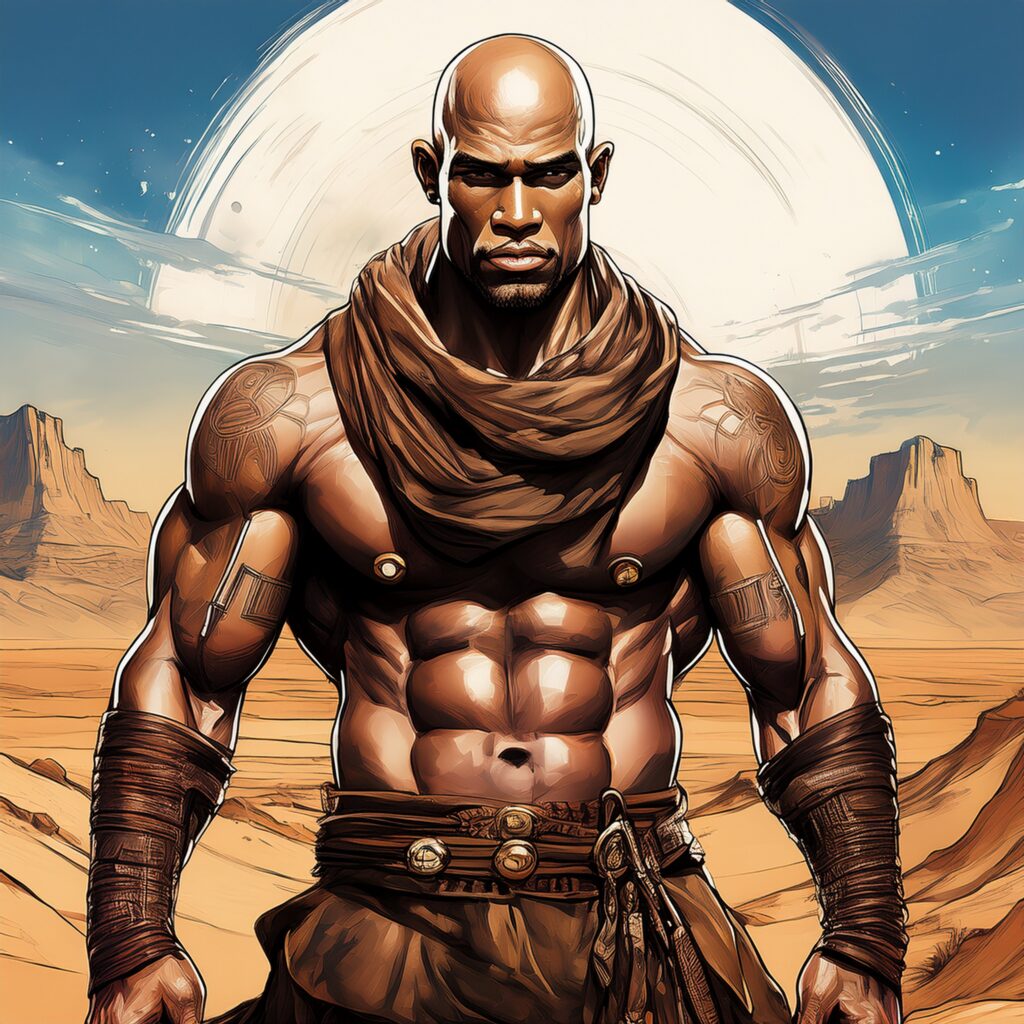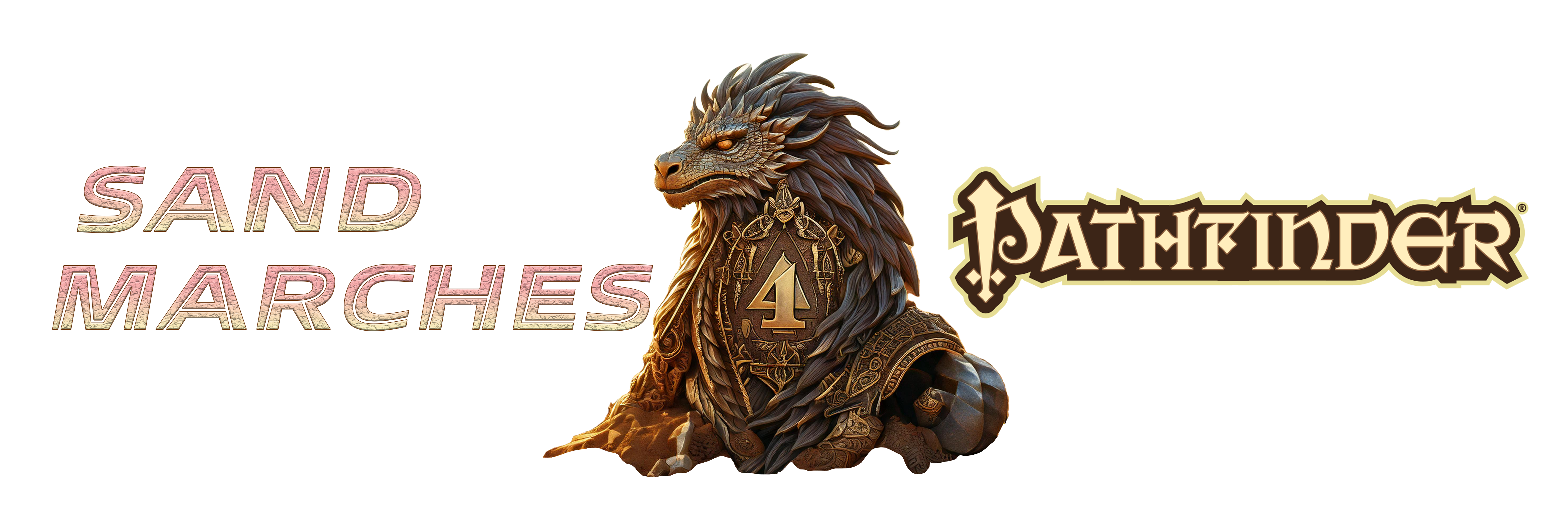Mul

Born from the unlikely parentage of dwarves and humans, muls combine the height and adaptable nature of humans with the musculature and resilience of dwarves. Muls enjoy traits that are uniquely their own, such as their robust metabolism and almost inexhaustible capacity for work.
The hybrid has disadvantages as well: sterility, and the social repercussions of being created for a life of slavery. Humans and dwarves are not typically attracted to each other. The only reason that muls are so common in the Tablelands is because of their value as labourers and gladiators: slave-sellers force-breed humans and dwarves for profit. While mul-breeding practices are exorbitantly lucrative, they are often lethal to mother and baby. Conception is difficult and impractical, often taking months to achieve. Even once conceived, the mul takes twelve months to carry to term; fatalities during this period are high. As likely as not, anxious overseers cut muls from the dying bodies of their mothers.
Personality: Muls are hard, driven, pragmatic folk with little remorse or sympathy in their hearts. Many grow up under the lash, having been taken from their parents while very young and subjected to brutal training for the arena or grinding toil in fields or quarries. Consequently, muls have a hard time offering friendship and trust to anyone. More than a few muls, scarred by the hardships of their upbringing, spend their days as bitter, violent misanthropes. Others are suspicious, grasping mercenaries who have learned never to lift a finger on behalf of another person without establishing what they will gain from providing aid.
Despite their tendency to be sullen or self-centred, muls can learn to work alongside others. Growing up in the slave pits and the underclass of society taught them how to forge alliances and understandings; their survival demanded nothing less.
All gladiators who perform well in the arenas receive some degree of pampered treatment, but muls receive more pampering than others. Some mul gladiators even see slavery as an acceptable part of their lives. However, those who acquire a taste of freedom will fight for it. Stoic and dull to pain, muls are not easily intimidated by the lash. Masters are loath to slay or maim a mul who tries repeatedly to escape, although those who help the mul’s escape will be tormented in order to punish the mul without damaging valuable property. Once a mul escapes or earns his freedom, slavery remains a dominant part of his life. Most muls are heavily marked with tattoos that mark their ownership, history, capabilities, and disciplinary measures. Even untattooed muls are marked as a potential windfall for slavers: it is clearly cheaper to “retrieve” a mul who slavers can claim had run away than to start from scratch in the breeding pits.
Physical: Second only to the half-giant, the mul is the strongest of the common humanoid races of the Tablelands. Muls grow as high as seven feet, weighing upwards of 250 pounds. Muscular and fit, muls resemble powerfully built humans. Although one might expect muls to average somewhere between dwarf and human stature, they are taller than most humans. Male muls have truly heroic proportions – broad shoulders, narrow waists, powerful thighs, and thick arms. Females, while not as heavily muscled, are tall, strong, and athletic. Many muls of both genders are hairless, although some grow topknots of dark hair. Their faces hint at their dwarven ancestry, with strong, stern features and small, swept-back ears that come to subtle points. Mul skin and eye colours are as varied as they are in humans, but many muls have a copper or deeply bronzed complexion, and a few have eyes of a startling honey-gold or green-gold colour.
Muls have little collective racial identity and adopt the dress and fashion of their homes. However, they are fond of tattoos and favour simple geometric patterns rather than depictions of creatures or objects. In this way, they honour their dwarven heritage with designs reminiscent of dwarven motifs.
Relations: Most mul labourers master the conventions of slave life, figuring out through painful experience who can be trusted and who cannot. Muls learn from their mistakes in the slave pits to a greater extent than other races not because they are cleverer, but because – unlike slaves of other races – they tend to survive their mistakes, while other slave races are less expensive and therefore disposable. Only the most foolish and disobedient mul would be killed. Most masters will sell a problem mul slave rather than kill him. Their mastery of the rules of slave life and their boundless capacity for hard work allows them to gain favour with their masters and reputation among their fellow slaves.
Lands: As a collective group, muls have no lands to call their own. Occasionally, escaped muls band together as outlaws and fugitives, because of their common ex-slave backgrounds, and because their mul metabolism makes it easier for them to survive as fugitives while other races cannot keep up. Almost without exception, muls are born in the slave pits of the merchants and nobles of the city-states. Most are set to work as labourers, some as gladiators, and fewer yet as soldier-slaves. Very few earn their freedom; a greater number escape to freedom among the tribes of ex-slaves that inhabit the wastes.
Language: Muls speak the common tongue of slaves, but those favoured muls that stay in one city long enough before being sold to the next sometimes pick up the city language. Because of their tireless metabolism, muls have the capacity to integrate with peoples that other races could not dream of living with, such as elves and thri-kreen. Despite their dwarven heritage, few muls learn that tongue, finding memories of their parentage uncomfortable at best.
Mul Society: Muls have no racial history or a separate culture. They are sterile and cannot reproduce, preventing them from forming family groups and clans. The vast majority of muls are born in slavery, through breeding programmes. Often, the parents resent their roles in the breeding programme and shun the child, leaving the mul to a lonely, hard existence. The taskmaster’s whip takes the place of a family. For these reasons, many muls never seek friends or companionship, and often have rough personalities with violent tendencies. The mul slave trade is very profitable, and thus the breeding programmes continue. As a slave, a mul has his profession selected for him and is given extensive training as he grows. Mul gladiators are often very successful and win a lot of money for their owners. Highly successful gladiators are looked after by their owners, receiving a large retinue of other slaves to tend to their whims and needs. This has lead to the expression “pampered like a mul” being used often by the common folk.
Role-playing Suggestions: Born to the slave pens, you never knew love or affection; the taskmaster’s whip took the place of loving parents. As far as you have seen, all of life’s problems that can be solved are solved by sheer brute force. You know to bow to force when you see it, especially the veiled force of wealth and privilege. The noble and templar may not look strong, but they can kill a man with a word. You are capable of affection, trust, and friendship, but camaraderie is easier for you to understand and express – warriors slap each other on the shoulder after a victory, or give their lives for each other in battle. You don’t think of that sort of event as “friendship” – it just happens.
The following game statistics apply to the mul player
Mul Racial Traits
+4 Strength, +2 Constitution, –2 Intelligence, +2 Wisdom, –2 Charisma: Muls are Strong and Brave.
Medium: Muls are Medium creatures and have no bonuses or penalties due to their size.
Normal Speed: Muls have a base speed of 30 feet.
Darkvision: Muls can see in the dark up to 60 feet.
Dwarf Blood: Muls count as both Dwarves and humans for any effect related to race.
Mul Exertion: Muls Receive Endurance and Diehard as bonus Feats.
Weapon Familiarity: Muls are always proficient with all weapons and improvised weapons.
Languages: Muls begin play speaking Common. Muls with high Intelligence scores can choose from the following languages: Elven, Dwarven, Giant, and Thri-Kreen.
Favoured Class Options
Alchemist: Add +1/4 to the alchemist’s natural armour bonus when using his mutagen.
Barbarian: Add +1 to the barbarian’s total number of rage rounds per day.
Bard: Add +1 to the bard’s total number of bardic performance rounds per day.
Cavalier: Add +1/4 to the cavalier’s banner bonus.
Cleric: Select one domain power granted at 1st level that is normally usable a number of times per day equal to 3 + the cleric’s Wisdom modifier. The cleric adds +1/2 to the number of uses per day of that domain power.
Druid: Add a +1/2 bonus on Diplomacy and Intimidate checks to change a creature’s attitude.
Fighter: Add +1 to the fighter’s CMD when resisting two combat maneuvers of the character’s choice.
Gladiator: Add 1/4 to the brawler’s effective level to determine her unarmed strike damage.
Magus: Add +1/4 point to the magus’ arcane pool.
Monk: Reduce the Hardness of any object made of clay, stone, or metal by 1 whenever the object is struck by the monk’s unarmed strike (minimum of 0).
Oracle: Reduce the penalty for not being proficient with one weapon by 1. When the nonproficiency penalty for a weapon becomes 0 because of this ability, the oracle is treated as having the appropriate Martial or Exotic Weapon Proficiency feat with that weapon.
Ranger: Add +1 hit point or +1 skill rank to the ranger’s animal companion. If the ranger ever replaces his companion, the new companion gains these bonus hit points or skill ranks.
Rogue: The rogue gains +1/6 of a new rogue talent.
Sorcerer: Add one spell known from the sorcerer spell list. This spell must be at least one level below the highest spell level the sorcerer can cast.
Summoner: Add a +1/4 natural armor bonus to the AC of the summoner’s eidolon.
Templar: Add +1/2 to the templar’s level for the purpose of determining the effects of one type of judgment.
Witch: Add +1/4 natural armor bonus to the AC of the witch’s familiar.
Wizard: Add one spell from the wizard spell list to the wizard’s spellbook. This spell must be at least one level below the highest spell level the wizard can cast.
